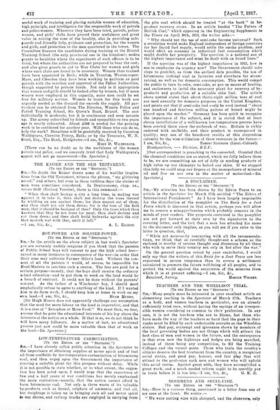LOW-TEMPERATURE CARBONIZATION.
[To THE EDITOR OF THE " SPECTATOR ."]
615,—I have already called public attention in the Spectator to the importance of obtaining supplies of motor spirit and of fuel oil from coalfields by low-temperature carbonization of bituminous coal, and then urged upon the Government the importance of erecting a suitable plant for this purpose without delay. While it is not possible to state whether, or to what extent, the sugges- tion has been acted upon, I would urge that the experience of two and a half years of war conditions has merely emphasized the main contention—namely, that the nation cannot afford to burn bituminous coal. Not only is there waste of its 'valuable by-products such as benzol, sulphate of ammonia, and fuel oil, but freightage is taken up in bringing such oil and motor spirit to our shores, and railway trucks are employed in carrying from the pits coal which should be treated " at the bank " in by- product recovery ovens. In an article headed " The Future of British Coal," which appeared in the Engineering Supplement to the Times on April 30th, 1913, the writer asks :- " Why should not the use of semi-coke become universal? Such a revolution would make England independent of foreign countries for her liquid fuel supply, would settle the smoke problem, and would effect an economy in industrial fuel consumption which might double her prosperity. The question is a national one of the highest importance and must be dealt with on broad lines."
If the question was of the highest importance in 1913, how is one to emphasize its urgency now? The Government should take steps to prohibit, as from the earliest date possible, the use of bituminous (coking) coal in factories and elsewhere for steam- raising, as well as for domestic consumption. This would compel the public to turn to coke, semi-coke, or gas as means of heating, and coalowners to instal the necessary plant for recovery of by- products and production of a suitable Coke fuel. The article above quoted states that about thirty-eight million tons of coal are used annually for domestic purposes in the United Kingdom, and points out that if semi-coke fuel could be used instead " about one hundred and fourteen million gallons of benzol might be placed upon the market." Germany has been quick to recognize the importance of the subject, and it is stated that at least eleven installations of a well-known low-temperature process have been erected there since the outbreak of war. Britain is richly endowed with coalfields, and their product is unsurpassed in quality; may one of the beneficent results of this stupendous calamity be the wise utilization of these resources in the future.— [Our correspondent is preaching to the converted. Granted that the chemical conditions are as stated, which we fully believe them to be, we are committing an act of folly in sending products of high value up our chimneys to befoul our skies. If we stopped this folly we could snap our fingers at the monopolizers of mineral oil and live on our own in the matter of motor-fuel.—ED. Spectator.]


























 Previous page
Previous page